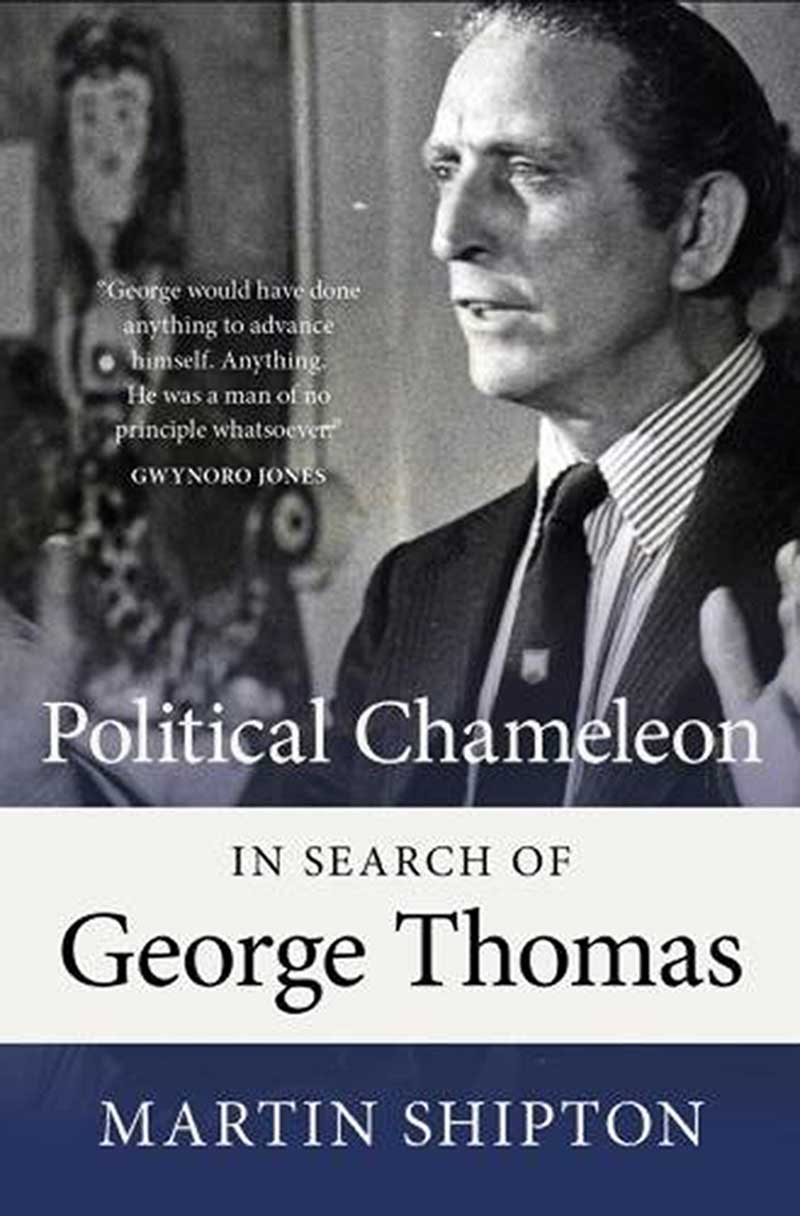Review:
Political Chameleon: In Search of George Thomas by Martin Shipton From Planet 229

John Osmond reviews
Political Chameleon: In Search of George Thomas
by Martin Shipton

Welsh Academic Press, £16.99
Leo Abse, an acute reader of the flaws of his fellow politicians, was an admirer of George Thomas and counted him a life-long friend. Yet following Thomas’s death in 1997 Abse had no compunction in revealing the repressed homosexuality that on numerous occasions led Thomas to the edge of disaster. Abse justifies his revelations by insisting that Thomas’s sexual orientation was the source of the empathy and charisma that brought the widespread adulation in which he was held during his lifetime, not least in Wales.
The question that prompted Martin Shipton’s search for the ‘real’ George Thomas was whether he was also a paedophile. In 2014 the Daily Mirror published an allegation that George Thomas had raped a boy about nine years old in Cardiff around 1968, the year in which he became Secretary of State for Wales. These and other allegations were investigated by the police who were unable to reach a conclusive result. After an exhaustive examination of the available evidence Shipton, the Western Mail’s assiduous chief reporter, is forced to acknowledge that we will probably never know the truth. Even so his researches in other respects allows him to conclude that the politician’s reputation ‘lies in ruins’.
Looking at Thomas’s long political career as a Cardiff MP from 1945 to the 1980s Shipton finds plenty of reasons for this judgement. He sees him as a coward and a creep, a bully who looked up to others, one whose political persuasions followed the dictates of power, who moved effortlessly from the left to the far right, a Labour politician who ended up hating Labour and adoring Margaret Thatcher, a fixer of Honours, a scourge of Welsh nationalism who was the ultimate British nationalist.
How on earth could George Thomas have been so well regarded in his lifetime? For a short while, as a young journalist in the early 1970s, I got to know him quite well. There were family connections and he enjoyed taking me under his wing. He was a useful contact, especially in the House of Commons. However, once he sensed my commitment to devolution he severed all connections. I never really liked him but felt his charm and warmth. There was no doubting his charisma. Once he came to where I was living in Cardiff and a woman over the road rushed to greet him: ‘Oh, Mr Thomas, it is so good to see you in our street.’
This was before George had achieved his celebrity as Speaker of the House of Commons, magnified by those early radio broadcasts with his unmistakeable accent intoning ‘Order, Order!’ But it came after he had been Secretary of State for Wales. In this role he demonstrated the baleful shortcomings of the Welsh Office’s subordinate position in Whitehall. Shipton describes how Thomas insisted that £250,000 from the Aberfan disaster fund be used to pay a quarter of the £1m costs of removing what was left of the tip. Another £250,000 was contributed by the Coal Board with the balance coming from the government in a deal Thomas negotiated with the Treasury.
Just as telling was the incident in which Thomas with Lord Snowden visited the home of one of the bereaved parents. When Snowden returned from the back kitchen bearing tea, Shipton reports Thomas telling the grieving mother, ‘Here is the Queen’s brother-in-law waiting on us.’
The book is full of accounts of Thomas’s cloying and sycophantic relationship with Royalty, starting with his handling of the Investiture of Prince Charles at Caernarfon Castle in 1969. The feelings were reciprocated. In 1981 Charles requested that George read the lesson at his wedding to Diana. A few years later he wanted George to become Lord Warden of the Duchy of Cornwall, chairing the council that runs his estate. Just weeks before Thomas died Charles sent him a gift with a letter which ended, ‘You are very much in my thoughts and prayers and I wanted to send this very small token of affection and esteem, together with every possible healing wish.’
Ultimately, Thomas was a peripheral politician who left very little mark. As Leo Abse himself concludes in his otherwise warm account, ‘George Thomas leaves no heirs, physically or spiritually. He was himself, alone, and his charisma died with him.’ So why do we need this biography? Shipton argues it is because Thomas represents a kind of politics that persists to this day and one that should be consigned to history.
The politics he is referring to is Thomas’s undoubted colonial cringe and opposition to a Welsh nationalism epitomised by what he saw as ‘Welsh language fanatics’. These he identified as much within his own party at Westminster in the early 1970s – MPs like Cledwyn Hughes, Elystan Morgan, Tom Ellis and Goronwy Roberts – as activists within Plaid Cymru or Cymdeithas yr Iaith.
But rather than representing any political tendency George Thomas’s attitudes and character were a one-off. To a great extent they were the result of the warped early childhood he experienced in the Rhondda in the 1920s. Leo Abse gave an account of it in his book Tony Blair – The Man Who Lost His Smile, published in 2003. Shipton acknowledges this but does not, I think, take it sufficiently on board. Thomas had an abusive, alcoholic, bigamist father, who systematically beat his family up and ultimately left them in a state of poverty. It is not without significance, either, that the father was a Welsh speaker from Carmarthenshire. The mother’s family was from Hampshire and her father established the first Methodist English-speaking chapel in Tonypandy. Thomas was left in the arms of his Mam and stayed there, an under-developed personality, a dissembler and malicious for the rest of his life.
This it seems to me is the significance of the George Thomas story. It is the havoc that can be wreaked by a damaged upbringing, when the abused child reaches adulthood and in turn vents his own insecurities on the world. It is a lesson, too, in how much that can be amplified if the individual concerned finds his way to the upper reaches of the political establishment.
About the author
John Osmond is a writer and journalist. He was a political correspondent with The Western Mail during the 1970s, worked as a television producer in the 1980s, before becoming inaugural Director of the Institute of Welsh Affairs in the 1990s. His first novel Ten million stars are burning is published by Gomer in March.

